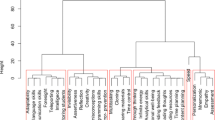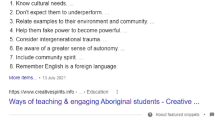Abstract
The International Bureau of Education is launching a research project on the training of teachers for intercultural education. The project is called ‘Basic Education for Participation and Democracy: Key Issues in Human Resources Development (Teachers and Multicultural/Intercultural Education)’. The general objective of the project is to develop countries' capacities to improve basic education, especially in multicultural contexts, and particularly through teacher training. Another objective of the project is to improve teachers' capacities to educate minorities, which is an important element in the building of a more democratic society.
This article summarizes the results of the project and integrates them with strategies and methods developed by the Laboratoire de didactique et épistémologie des sciences of the University of Geneva, the Department of Biology of the University of Pavia and other research and training centres in Europe and Latin America.
Similar content being viewed by others
Bibliography
Barton, B. 1990. He maturanga tau ahua reorua: he kitenga o tetahi kalako [Bilingual mathematics education: a practitioner's point of view].Science and mathematics education papers—1990, p. 159–76. Hamilton, New Zealand, University of Waitako, Centre for Science and Mathematics Education Research.
Begg, A. 1993. Communication and assessment in mathematics education. In: Stephens, M. et al., eds.Communicating mathematics: perspectives from classroom practice and current research, p. 283–90. Hawthorn, Australia, The Australian Council for Educational Research Ltd.
Carter-Cooper, E. 1990.ABCD: accepting behaviours for cultural diversity for teachers' projects. Lansing, Michigan Department of Education, Office of Professional Development.
Christie, M.J. 1992.Aboriginal perspectives on experience and learning: the role of language in Aboriginal education. Victoria, Australia, Deakin University. 111 p.
Clarkson, P.; Thomas, J. 1993. Communicating mathematics bilingually. In: Stephens, M. et al., eds., op. cit., Hawthorn, Australia, The Australian Council for Educational Research Ltd. p. 263–73.
Cruz, B.C. 1993. How to improve home-school relations in minority communities.Tips for principals. Reston, VA, National Association of Secondary School Principals. 2 p.
Ferguson, T. 1991. Communicating in the multilingual classroom. In: MacGregor, M.; Moore, R., eds.Teaching mathematics in the multicultural classroom: a resource for teachers and teacher educators, p. 33–47. Melbourne, School of Science and Mathematics Education, The University of Melbourne.
Food and Agricultural Organization of the United Nations (FAO). 1987.A summary of the process and evaluation of the strategic campaign extension on rat control in Malaysia. Rome. (Evaluation Report SEC/No. 2.)
Gagliardi, R. 1983. Les concepts structurants de la biologie [Structurant concepts of biology].Actes des Vèmes journèes internationales sur l'education scientifique, p. 545–52. Chamonix, France.
Gagliardi, R. 1987. Concepts structurants en éducation à la santé [Structurant concepts in health education].Actes des IXèmes journées internationales sur l'education scientifique, p. 543–50. Chamonix, France.
— 1991.Model training kit for extensionists on fish technology and quality control at artisanal level: analysis of the required characteristics of a model training kit. Rome, Food and Agricultural Organization of the United Nations (FAO). 52 p. (Project Report of the FAO.)
— 1994.Obstáculos al aprendizaje — Obstáculos a la enseñanza en contextos multiculturales [Learning obstacles: teaching obstacles in multicultural contexts]. Geneva, UNESCO: International Bureau of Education. (Papers on teacher training and multicultural/intercultural education, no. 25.)
— 1994.An integrated model for teacher training in multicultural contexts. Geneva, UNESCO: International Bureau of Education. (Papers on teacher training and multicultural/intercultural education, no. 1.)
—; Alfthan, T. 1993.Environmental training: policy and practice for sustainable development. Geneva, International Labour Office. 140 p.
Gagliardi, R. 1993. La formation pour le développement durable [Training for sustainable development].Actes des XVes journées internationales sur la communication, l'éducation et la culture scientifiques et techniques, p. 549–55. Chamonix, France.
Gagliardi R.; Bernardini Mosconi, P. 1988. Éducation à l'environnement: utilisation des représentations des élèves pour la préparation d'un curriculum sur l'écologie [Environmental education: using students' representations to prepare a curriculum on ecology].Actes des Xèmes journées internationales sur l'éducation scientifique, p. 521–26. Chamonix, France.
Gagliardi, R.; Bernardini Mosconi, P.; Bocchiola, M.T. 1993.Il bambino, il maestro e le science: testo di formazione per insegnanti di scuola elementare [The child, the teacher, and science: training tests for teachers at the elementary level]. Pavia, Italy, Edizioni Antares. 166 p.
Giordan, A.; De Vecchi, G. 1987.Les origines du savoir [The origins of knowledge]. Neuchatel/Paris, Editions Delachaux & Niestlé. 214 p.
Hall, E.T. 1974. Making sense without words. In: Fersh, S., ed.Learning about peoples and cultures. Evanston, IL, McDougal, Litell & Co.
— 1987.Au-delà de la culture [Beyond culture]. Paris, Éditions de Seuil. 234 p.
Hall, E.T.; Reed Hall, M. 1987.Hidden differences: doing business with the Japanese. New York, Ed. Anchor Press/Doubleday. 172 p.
Kepert, B. 1993. Aboriginal students communicating mathematics. In: Stephens, M. et al., eds.Communicating mathematics: perspectives from classroom practice and current research, p. 274–82. Hawthorn, Australian Council for Educational Research (ACER).
MacGregor, M. 1991. Language, culture and mathematics learning. In: MacGregor, M.; Moore, R., eds.Teaching mathematics in the multicultural classroom, p. 5–25. Melbourne, Institute of Education, University of Melbourne.
Marthaler, F. 1991. Le four solaire est pour aujourd'hui [The solar oven is for today].Actes des XIIIèmes journées internationales sur la communication, l'éducation et la culture scientifiques et techniques, p. 352–57. Chamonix, France.
McPherson Waiti, P. 1990. A Maori person's viewpoint on the education of Maori children and, in particular, science education.Science and mathematics education papers, 1990, op. cit., p. 177–201.
Obel, E. 1989. Women and afforestation in Kenya.Voices from Africa (New York, United Nations Non-Governmental Liaison Service).
Ohia, M. 1990. The unresolved conflict and debate: an overview of bilingual education in New Zealand secondary schools. In:Science and mathematics education papers, 1990, op. cit., p. 111–32.
Ohia, M.; Moloney, M. 1990. A survey of mathematics teaching in New Zealand secondary school bilingual units. In:Science and mathematics education papers, 1990, op. cit., p. 133–58.
Paccaud, M. Personal communication to the author.
Pérez de Eulate, L.; Gagliardi, R. 1988. Les représentations des élèves dans la formation des instituteurs en biologie [Student representations in the training of biology teachers].Actes des Xèmes journées internationales sur l'éducation scientifique. Chamonix, France, p. 551–54.
Plotkin, M.J. 1993.Tales of a shaman's apprentice. Bergenfield, NJ, Viking Penguin. 318 p.
Raichvarg, D. Vers la compréhension des êtres infiniment petits [Towards an understanding of infinitely small beings]. In: Giordan, A., ed.Histoire de la biologie, Paris, Editions Technique et Documentation Lavoisier, p. 91–198. (Petite Collection d'Histoire des Sciences, vol. 1.)
Stone, R. 1992. Researchers score victory over pesticides and pests in Asia.Science (Washington, DC), No. 5,061, 29 May, p. 1,272–73.
Watson, H. 1989.Singing the land, signing the land. Victoria, Australia, Deakin University. 66 p.
Werner, D.; Bower, B. 1994.Helping health-care workers learn. Palo Alto, CA, The Hesperian Foundation.
Wolpert, L. 1993.The unnatural nature of science. London, Faber & Faber. 188 p.
World Health Organization. 1987.The community health worker. Geneva. 461 p.
Yirrkala Literature Centre. n.d.Gayngaru plant walk. Nhulunbuy, N.T., Australia. 12 p.
Author information
Authors and Affiliations
Additional information
Ph.D. Professor at the University of Pavia, Italy. Member of the Laboratoire de didactique et épistémologie des sciences, University of Geneva. Technical adviser to the UNESCO: International Bureau of Education's Project ‘Basic Education for Participation and Democracy: Key Issues in Human Resources Development (Teachers and Multicultural/Intercultural Education)’. His many publications includeTeacher training and multiculturalism: national studies (1995).
About this article
Cite this article
Gagliardi, R. Scientific and technological training for traditional communities. Prospects 25, 57–78 (1995). https://doi.org/10.1007/BF02334285
Issue Date:
DOI: https://doi.org/10.1007/BF02334285




